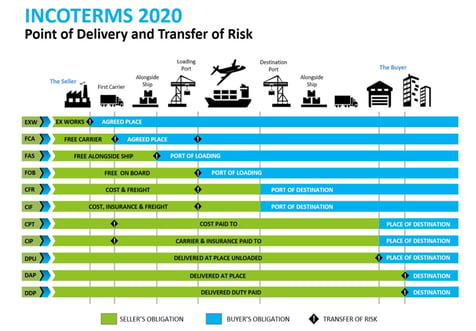We live in a world where there are standards across all aspects of our lives. These standards were created to make things easier for everyone; it is no different in the exporting world. When shipping your products, these standards are known as Incoterms.
What are Incoterms?Incoterms are a collection of rules, that are used to make shipping contracts and trade agreements between parties across the world. Incoterms clearly identify the responsibilities of each party, during every stage of the shipping process. Responsibilities can include costs, risks, who handles transport, etc.
History of Incoterms
The name Incoterms was derived from the phrase, INternational COmmercial Terms. In 1919, the International Chamber of Commerce was founded in Paris, France. There were no established rules regarding trade/commerce at that time. This group brought it upon themselves to create a set of “global standards for business.” Finally, in 1936, the ICC released the first set of Incoterms and nearly 84 years later, over 140 countries accept Incoterms as the standard in commercial shipping.
Classes of Incoterms
Incoterms are updated by the ICC every 10 years, so the current set of Incoterms are known as Incoterms® 2020. Within the Incoterms, there are various categories of rules based on modes of transport. These classes are often identified via their acronyms.
Air, Sea, & Truck
- EXW: Ex Works
- FCA: Free Carrier
- CPT: Carriage Paid To
- CIP: Carriage & Insurance Paid To
- DAP: Delivered At Place
- DPU: Delivered At Place Unloaded
- DDP: Delivered Duty Paid
Sea/Waterway Only
- CFR: Cost & Freight
- CIF: Cost, Insurance, Freight
- FAS: Free Along Ship (Bulk)
- FOB: Free On Board
Why You Should Use Incoterms
Incoterms can be confusing to those who don’t utilize them daily and are often misused. Utilizing a certified freight forwarder for your shipping needs and having an Export Credit Insurance policy from the Export-Import Bank of the United States will mitigate your risk and provide peace of mind knowing you are protected from any potential mishaps that may happen during transport.
[1] Kathy O’Keefe: Export Consulting Services, Ch 14 Incoterms & Ch 15 Documentation, 2020, pg 20.
 [1]
[1]